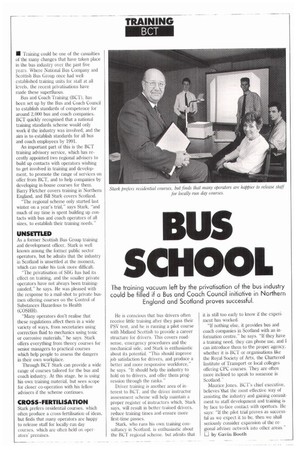TRAINING BCT
Page 36

If you've noticed an error in this article please click here to report it so we can fix it.
• Training could be one of the casualties of the many changes that have taken place in the bus industry over the past five years. Where National Bus Company and Scottish Bus Group once had wellestablished training units for staff at all levels, the recent privatisations have made these superfluous.
Bus and Coach Training (BCT), has been set up by the Bus and Coach Council to establish standards of competence for around 2,000 bus and coach companies. BCT quickly recognised that a national training standards scheme would only work if the industry was involved, and the aim is to establish standards for all bus and coach employees by 1991.
An important part of this is the BCT training advisory service, which has recently appointed two regional advisers to build up contacts with operators wishing to get involved in training and development, to promote the range of services on offer from BCT, and to help companies by developing in-house courses for them. Barry Fletcher covers training in Northern England, and Bill Stark covers Scotland.
"The regional scheme only started last winter on a year's trial," says Stark, "and much of my time is spent building up contacts with bus and coach operators of all sizes, to establish their training needs."
As a former Scottish Bus Group training and development officer, Stark is well known among the former public sector operators, but he admits that the industry in Scotland is unsettled at the moment, which can make his task more difficult.
"The privatisation of SBG has had its effect on training, and the smaller private operators have not always been trainingminded," he says. He was pleased with the response to a mail-shot to private busmen offering courses on the Control of Substances Hazardous to Health (COSHH).
"Many operators don't realise that these regulations affect them in a wide variety of ways, from secretaries using correction fluid to mechanics using toxic or corrosive materials," he says. Stark offers everything from theory courses for senior managers to practical courses which help people to assess the dangers in their own workplace.
Through BCT Stark can provide a wide range of courses tailored for the bus and coach industry. At this stage, he is using his own training material, but sees scope for closer co-operation with his fellow advisers if the scheme continues.
Stark prefers residential courses, which often produce a cross-fertilisation of ideas, but finds that many operators are happy to release staff for locally-run day courses, which are often held on oper ators' premises,




































































































